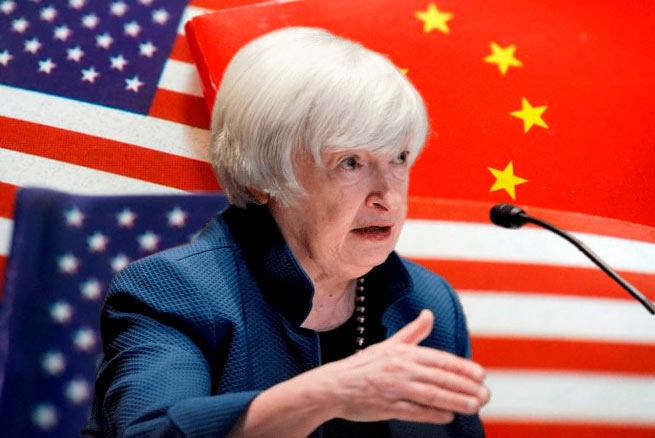
*Editor’s note: On March 4, 2022, Russia enacted a law that criminalizes public opposition to, or independent news reporting about, the war in Ukraine. The law makes it a crime to call the war a “war” rather than a “special military operation” on social media or in a news article or broadcast. The law is understood to penalize any language that “discredits” Russia’s use of its military in Ukraine, calls for sanctions or protests Russia’s invasion of Ukraine. It punishes anyone found to spread “false information” about the invasion with up to 15 years in prison.
Washington awaits Xi Jinping’s return peacekeeping visit in November.
U.S. Treasury Secretary Janet Yellen is expected to arrive in Beijing on Thursday where she will discuss trade and economic issues with Chinese officials. The visit is taking place at a time when both American and European businesses are actively advocating for peace between China and the United States. Chinese business circles believe that China’s leadership is also determined to avoid a full separation of the two major economies, as Yellen put it. After all, it would have caused huge losses for entrepreneurs in both countries and beyond.
Han Lin, country head for The Asia Group, says companies in China and the U.S. are finding comfort in the fact that their leaders are seeking ways to deescalate tensions between the two nations. This gives U.S. corporate directors operating in China time to take a deep breath and focus on the fundamentals of China’s economy and their companies’ plans for 2024.
Chinese officials also expect U.S. businesses to become active mediators and help reach an agreement between the political leaders of the two countries. Fang Xinghai, co-vice chairman of the China Securities Regulatory Commission, states that China will never attempt to fully separate the two major economies.
It is no coincidence that in June, Chinese President Xi Jinping met with Bill Gates, co-founder of Microsoft, and called him an old friend. And earlier, Chinese Foreign Minister Qin Gang welcomed Tesla CEO Elon Musk to Beijing. Nick Marro, the Economist Intelligence Unit’s lead for global trade, believes that these recent meetings were intended to reassure American business circles that have been shaken by the Chinese authorities’ investigation into consulting firm Capvision and the slower-than-expected recovery of the Chinese economy from the pandemic.
Capvision offices in Shanghai, Beijing, Suzhou and Shenzhen, China, were raided and a number of their records were seized. “Mutual skepticism between the United States and China over a wide range of economic and security issues has festered in recent years. The last time a U.S. Treasury secretary visited China, Washington and Beijing were locked in a trade war, the Trump administration was preparing to label China a currency manipulator, and fraying relations between the two countries were roiling global markets,” The New York Times reported.
Four years later, many economic policy disputes remain and have even intensified, even though Joe Biden’s administration is less critical of China. Moreover, tariffs imposed by Donald Trump on Chinese imports remain in place. In the meantime, Biden is working on limiting China’s access to critical technologies, such as semiconductors. Washington is likely to impose new restrictions on U.S. investment in China.
U.S. Treasury Department officials are trying to lower expectations of what Yellen can achieve during her four-day trip. They say Yellen is aiming to improve communication between the world’s two largest economies; however, it’s going to be difficult for Yellen to hold talks with her Chinese counterparts. Beijing still remains enraged by Washington’s 2022 decision to limit selling chip-making machinery to China. This has already started slowing down the development of artificial intelligence in China.
In the wake of the U.S. decision, the Netherlands, home to semiconductor machinery maker ASML, introduced restrictions on exporting machinery to China. In response, China has imposed export restrictions on germanium and gallium, which are both used in chip production.
It is true that neither Biden nor Xi agrees with those experts who compare current U.S.-Chinese relations to the Cold War between the United States and the Soviet Union. However, polls show that the Americans are beginning to treat China the same way they treated the Soviet Union.
Some Chinese officials and U.S. manufacturers were looking forward to Biden lifting Trump’s tariffs on Chinese imports, but it is not going to happen any time soon. The U.S. has always been concerned about the Chinese currency. U.S. officials have at times accused Beijing of artificially weakening its currency in order to make their export goods cheaper. Over the past 12 months, the renminbi has fallen 7% against the dollar. This could be the most pressing issue for Yellen’s upcoming talks with Chinese officials.
Nevertheless, Doug Barry, a former senior director of communications and publications at the U.S.-China Business Council, says that there is still a way to improve U.S.-China relations. After all, Xi may meet with Biden in November during the Asia-Pacific Economic Cooperation summit in San Francisco, and the Chinese leader has been invited.

Leave a Reply
You must be logged in to post a comment.